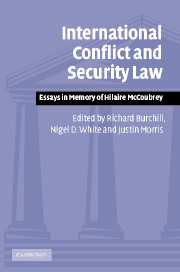Book contents
- Frontmatter
- Contents
- Biography of Hilaire McCoubrey
- Notes on contributors
- Foreword: There are men too gentle to live among wolves
- List of abbreviations
- 1 Hilaire McCoubrey and international conflict and security law
- 2 The development of operational law within Army Legal Services
- 3 Reflections on the relationship between the duty to educate in humanitarian law and the absence of a defence of mistake of law in the Rome Statute of the International Criminal Court
- 4 Superior orders and the International Criminal Court
- 5 Command responsibility: victors' justice or just desserts?
- 6 The proposed new neutral protective emblem: a long-term solution to a long-standing problem
- 7 Towards the unification of international humanitarian law?
- 8 Of vanishing points and paradoxes: terrorism and international humanitarian law
- 9 What is a legitimate military target?
- 10 The application of the European Convention on Human Rights during an international armed conflict
- 11 Regional organizations and the promotion and protection of democracy as a contribution to international peace and security
- 12 Self-defence, Security Council authority and Iraq
- 13 International law and the suppression of maritime violence
- 14 Law, power and force in an unbalanced world
- Bibliography of Hilaire McCoubrey's work
- Index
10 - The application of the European Convention on Human Rights during an international armed conflict
Published online by Cambridge University Press: 17 July 2009
- Frontmatter
- Contents
- Biography of Hilaire McCoubrey
- Notes on contributors
- Foreword: There are men too gentle to live among wolves
- List of abbreviations
- 1 Hilaire McCoubrey and international conflict and security law
- 2 The development of operational law within Army Legal Services
- 3 Reflections on the relationship between the duty to educate in humanitarian law and the absence of a defence of mistake of law in the Rome Statute of the International Criminal Court
- 4 Superior orders and the International Criminal Court
- 5 Command responsibility: victors' justice or just desserts?
- 6 The proposed new neutral protective emblem: a long-term solution to a long-standing problem
- 7 Towards the unification of international humanitarian law?
- 8 Of vanishing points and paradoxes: terrorism and international humanitarian law
- 9 What is a legitimate military target?
- 10 The application of the European Convention on Human Rights during an international armed conflict
- 11 Regional organizations and the promotion and protection of democracy as a contribution to international peace and security
- 12 Self-defence, Security Council authority and Iraq
- 13 International law and the suppression of maritime violence
- 14 Law, power and force in an unbalanced world
- Bibliography of Hilaire McCoubrey's work
- Index
Summary
We are in danger [because of the European Convention on Human Rights] of producing servicemen whose only purpose will be to deliver tea and sympathy, rather than carry out their proper combat duties.
This chapter will consider how the European Convention on Human Rights (ECHR) impacts upon military operations during an international armed conflict. It will, therefore, confine itself to those situations to which international humanitarian law applies concurrently with it in order to determine how far the ECHR affects the obligations assumed by states during such an armed conflict.
Introduction
A state party to the ECHR may find itself involved in an international armed conflict occurring on its territory, on the territory of another state, on the high seas, or in the airspace over such areas. It may send its armed forces under United Nations or NATO auspices to the territory of a state which is, itself, involved in an international armed conflict. Before considering these various situations it is necessary to analyse the scope of the ECHR to assess its impact upon an international armed conflict.
None of the states parties to the ECHR has entered a reservation as to its applicability should it become involved in an international armed conflict. France, however, has entered a reservation to Article 15(1) whereby a proclamation of a state of siege or emergency by the French government is to be understood as being compliant with Article 15(1), and ten states (Czech Republic, France, Lithuania, Moldova, Portugal, Russian Federation, Slovakia, Spain, Turkey, Ukraine) have made a reservation to a greater or lesser extent of the non-applicability of ECHR obligations to discipline within their armed forces.
- Type
- Chapter
- Information
- International Conflict and Security LawEssays in Memory of Hilaire McCoubrey, pp. 185 - 208Publisher: Cambridge University PressPrint publication year: 2005
- 1
- Cited by

